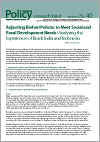
Abstract:This brief examines the social dimensions of the rapid expansion of biofuels as a key element of ‘green economies’ in the making. It compares three different contexts (Brazil, India and Indonesia) in the developing world, where biofuels have been often promoted under the arguments of poverty alleviation, social inclusion and rural development. The assessment reveals a general mismatch between the social discourse and the biofuel policy instruments adopted. Benefits to poor people in rural areas have been very limited, and far too often they have been left worse off after being incorporated in biofuel production chains under disadvantageous conditions. Better outcomes depend crucially on: (i) building on traditional livelihoods, rather than attempting to replace them; (ii) involving social movements in policy- and decision-making to ensure due consideration of the needs and interests of poor people in rural areas; and (iii) inserting provisions that allow smallholders to climb up the value chain, thus addressing the inequality structures that keep poor people poor. (…)